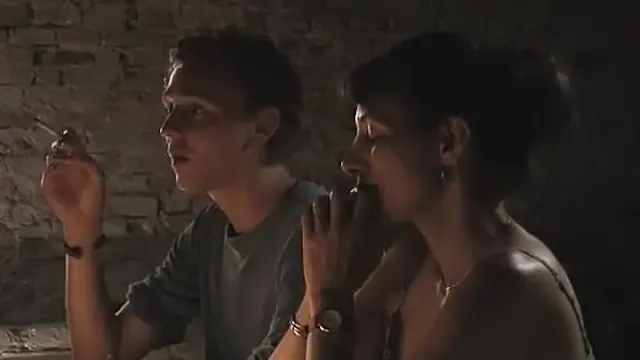
Cast: Mia Wasikowska, Tom Hiddleston, Jessica Chastain, Charlie Hunnam, Jim Beaver, Burn Gorman, Leslie Hope, Doug Jones. Screenplay: Guillermo del Toro, Matthew Robbins. Cinematography: Dan Laustsen. Production design: Thomas E. Sanders. Film editing: Bernat Vilaplana. Music: Fernando Velázquez.
In Crimson Peak, Guillermo del Toro takes all the elements of the Gothic romance and turns them up to 11, which is the best thing he could have done with such familiar, not to say cheesy, material. There's the dewy heroine who makes a dubious marriage, the sinister rival female, the doughty but dull spurned suitor, and of course the Old Dark House. This one makes Thornfield Hall, Manderley, and even the Castle of Otranto look like a suburban tract house: It's a great malevolent beetle of a mansion, squatting on a bleak landscape, decaying steadily and grossly while sinking into the mine above which it sits. It's inhabited by the cash-poor aristocrats Thomas Sharpe (Tom Hiddleston) and his sister, Lucille (Jessica Chastain), along with a sizable contingent of ghosts. To it, Thomas brings his bride, Edith (Mia Wasikowska), whose father has recently died (rather violently, as we have seen), leaving her the family fortune. Edith is spunky and imaginative, an aspiring writer of ghost fiction, having had her own encounters with ghosts who warned her to "beware Crimson Peak." What she doesn't know, of course, is that the place to which her husband has brought her is called Crimson Peak, for its blood-red clay, by the locals. Anyway, the truth will out, and in a variety of gruesome ways. What makes the movie work is that del Toro is willing to go over the top entertainingly, stretching credibility to (and sometimes beyond) the breaking point, without smirking about it and camping it up. So we have, for example, a duel between Edith and Lucille, with both wearing flimsy, flowing nightwear. (Kate Hawley's costume designs are splendidly excessive.) We have apparitions in various states of decay and a plethora of insect life. The ghost of Edith's mother appears in a form that looks something like a cross between a tarantula and a woman with dreadlocks. There are vats of disgusting red murk in the cellar in which things are submerged. It's all a bit much, but the actors know how to take it in their stride. Having played Loki in the Marvel movies and the vampire Adam in Jim Jarmusch's Only Lovers Left Alive (2013), Hiddleston in particular knows how to make a character both attractive and disquieting at the same time. Del Toro isn't up to anything of great moment in this movie, but it's good to see the material handled with a distinct sensibility and an avoidance of the tried and true.

























